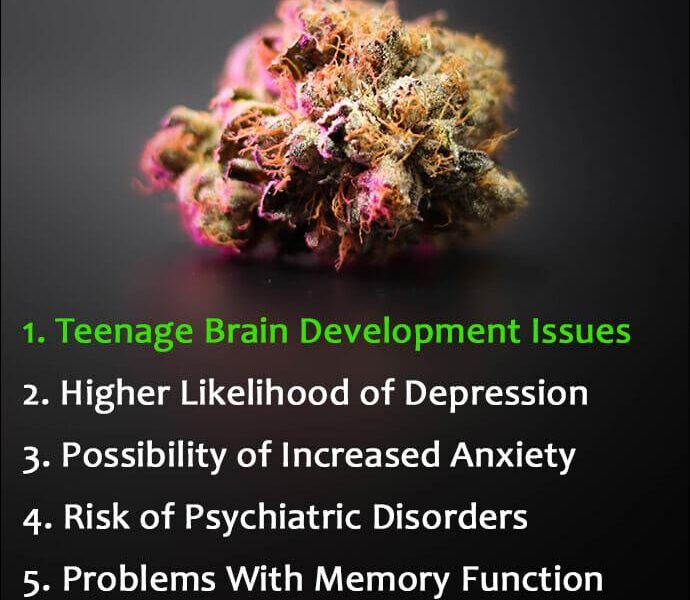Unveiling the Shades of Green: The Disadvantages of Marijuana
In an era where the once-stigmatized cannabis plant is increasingly embraced for its medicinal properties and recreational appeal, it’s easy to overlook the complexities that accompany its use. While the dialogue surrounding marijuana often spotlight sparkling benefits—such as pain relief and relaxation—there lies a shadowy side that warrants equal attention. This article aims to navigate the less glamorous territory of marijuana consumption, exploring the potential disadvantages that can arise from its use. From the impact on mental health to the implications for cognitive function, understanding these drawbacks fosters a more holistic view of this multifaceted substance. Join us as we delve deeper into the nuances of marijuana, understanding that every bloom may cast a shadow.
Table of Contents
- Impact on Mental Health and Cognitive Function
- Legal and Social Ramifications of Marijuana Use
- Physical Health Concerns Associated with Cannabis Consumption
- Understanding Dependency and Withdrawal Challenges
- Q&A
- To Conclude
Impact on Mental Health and Cognitive Function
The use of marijuana can significantly affect mental health, with various studies indicating a correlation between its consumption and an increase in symptoms of anxiety and depression. While some individuals may initially seek marijuana for its perceived calming effects, prolonged use can lead to heightened anxiety levels, making it counterproductive for those struggling with mental health issues. Common mental health impacts of marijuana use include:
- Increased feelings of paranoia
- Potential exacerbation of existing mental health disorders
- Difficulty in managing stress
Additionally, marijuana’s impact on cognitive function cannot be understated. Evidence suggests that habitual use may impair short-term memory, decrease attention span, and reduce the overall ability to process information effectively. This cognitive decline can affect various aspects of daily life and academic performance, especially among younger users. Key cognitive effects related to marijuana consumption are:
| Effect | Description |
|---|---|
| Memory Impairment | Difficulty in recalling information or experiences |
| Concentration Issues | Challenges in focusing on tasks or discussions |
| Decision-Making Challenges | Struggles with analyzing situations or making choices |
Legal and Social Ramifications of Marijuana Use
The legalization of marijuana in various jurisdictions has led to a complex landscape of legal and social implications. While it has provided individuals with increased access and a means of generating tax revenue, it has also resulted in a host of challenges. For instance, law enforcement agencies struggle with the repercussions of impaired driving, as many states have not established clear guidelines for marijuana-related offenses. Moreover, businesses often face difficulties in creating workplace policies that address marijuana use, especially as some employees may consume it legally outside of work hours.
From a social perspective, the perceived normalization of marijuana use can lead to potential shifts in community dynamics and public health. Risks include increased rates of dependency and an uptick in mental health issues among vulnerable populations. Additionally, public perception may affect youth engagement, as youth access to cannabis becomes more prevalent. To better understand the societal impact, consider the following table that outlines some key consequences:
| Aspect | Potential Consequences |
|---|---|
| Legal System | Increased litigation; challenges in regulation enforcement |
| Public Health | Rise in dependency rates; increased mental health issues |
| Workplace | Difficulties in policy formulation; safety concerns |
| Community | Changing social norms; potential for increased youth usage |
Physical Health Concerns Associated with Cannabis Consumption
While cannabis use is often associated with relaxation and euphoria, it also brings a range of physical health concerns that users should be aware of. Respiratory complications are among the most significant, especially for those who smoke marijuana. The combustion of cannabis releases harmful toxins similar to those found in tobacco smoke, which can irritate the lungs and lead to chronic bronchitis. Additionally, cardiovascular effects are notable; marijuana has been shown to increase heart rate and blood pressure shortly after consumption, potentially posing risks for individuals with pre-existing heart conditions.
Moreover, the impact of cannabis on appetite and metabolism should not be underestimated. While marijuana is famous for provoking the “munchies,” the overconsumption of unhealthy snacks can lead to weight gain and related health issues, such as diabetes and obesity. Long-term use can also affect reproductive health; studies suggest that heavy cannabis smoking may alter hormone levels, potentially leading to fertility challenges for both men and women. Below is a simple table summarizing these concerns:
| Health Concern | Potential Impact |
|---|---|
| Respiratory Issues | Chronic bronchitis and lung irritation |
| Cardiovascular Risks | Increased heart rate and blood pressure |
| Weight Gain | Higher risk of obesity and diabetes |
| Fertility Challenges | Hormonal alterations affecting reproduction |
Understanding Dependency and Withdrawal Challenges
When individuals regularly consume marijuana, they may develop a reliance on it, leading to a spectrum of challenges upon cessation. This dependency can manifest through a range of psychological and physical symptoms, which can detract significantly from an individual’s quality of life. Some of the common withdrawal symptoms include:
- Insomnia: Difficulty sleeping can contribute to heightened anxiety and irritability.
- Loss of Appetite: Many users experience a decrease in hunger levels, which can impact overall health.
- Mood Swings: Emotional instability may surface, leading to heightened frustration and sadness.
- Restlessness: A feeling of agitation can hinder daily activities and focus.
The withdrawal process can vary significantly from person to person, depending on several factors such as duration of use and individual biology. Understanding this process is crucial for anyone considering quitting, as it can help prepare them for potential obstacles. The table below summarizes some of the key factors associated with marijuana dependency and withdrawal:
| Factor | Impact on Withdrawal |
|---|---|
| Duration of Use | Longer use often results in more severe withdrawal symptoms. |
| Frequency of Use | Daily users may face stronger dependency issues. |
| Individual Biological Factors | Genetics and mental health can influence withdrawal experiences. |
Q&A
Q&A: The Disadvantages of Marijuana
Q: What are some common side effects associated with marijuana use?
A: Marijuana can lead to various side effects, including dizziness, fatigue, and impaired memory. Users may also experience anxiety or paranoia, particularly with high-THC strains. These effects can be unpredictable and vary greatly from person to person.
Q: How does marijuana affect cognitive function?
A: Research indicates that marijuana can impair cognitive functions such as attention, memory, and decision-making skills, especially during the acute intoxication phase. Long-term use, particularly in younger individuals whose brains are still developing, may lead to lasting cognitive deficits.
Q: What impact can marijuana have on mental health?
A: While some individuals use marijuana to alleviate symptoms of anxiety or depression, studies suggest it can exacerbate mental health disorders in others. Regular use has been linked to an increased risk of developing psychosis, especially in those with a family history of mental illness.
Q: Are there any risks associated with lung health when smoking marijuana?
A: Yes, smoking marijuana can have negative effects on lung health, similar to smoking tobacco. It may lead to chronic bronchitis, and long-term users may experience increased respiratory symptoms such as coughing and phlegm production.
Q: How does marijuana impact motivation and productivity?
A: Some users report a phenomenon known as “amotivational syndrome,” where regular marijuana use can lead to decreased motivation or an inability to engage in routine tasks. While more research is needed, this effect can hinder personal and professional development for certain individuals.
Q: Can marijuana affect driving abilities?
A: Yes, marijuana can impair motor skills and reaction times, significantly increasing the risk of accidents when driving. Just like alcohol, it can affect judgment and coordination, making it unsafe to operate a vehicle while under the influence.
Q: Are there any societal implications of widespread marijuana use?
A: The normalization of marijuana use can lead to increased public health challenges, including addiction treatment needs and potential increases in usage among youth. Additionally, regulatory challenges can arise, including ensuring safe consumption and controlling distribution.
Q: Is marijuana dependence a concern?
A: Yes, despite popular belief, marijuana can be addictive for some users. Studies suggest that about 9% of those who try it will develop a dependence, with the risk increasing among those who start using at a young age or use it frequently.
Q: What are the legal implications of marijuana use?
A: While marijuana is legal in many regions, it remains prohibited in others. This can lead to legal troubles for users, affecting employment, parental rights, and even immigration status. The changing legal landscape adds another layer of complexity to its use.
Q: How can individuals mitigate the disadvantages of marijuana?
A: Moderation is key. Users can minimize risks by being mindful of their consumption patterns, opting for strains with lower THC levels, and avoiding use in situations requiring full cognitive function, such as driving. Education and awareness about the potential drawbacks can also empower responsible use.
To Conclude
In the intricate tapestry of our modern society, the discourse surrounding marijuana encompasses a myriad of perspectives, each woven with threads of anecdote and scientific inquiry. While many may extol its virtues, it is equally vital to recognize the shadows that linger in its wake. The disadvantages of marijuana use, from cognitive impairments to potential dependency and its impact on mental health, remind us that even in the realm of natural alternatives, caution is paramount. As we continue to explore and understand this complex plant, let us approach the conversation with an open mind and a discerning eye, acknowledging both the potential benefits and the pitfalls that accompany its use. In doing so, we empower ourselves to make informed choices that pave the way for a balanced dialogue about marijuana in the broader context of health and wellness. After all, knowledge is a garden, and it grows best when cultivated with care.



